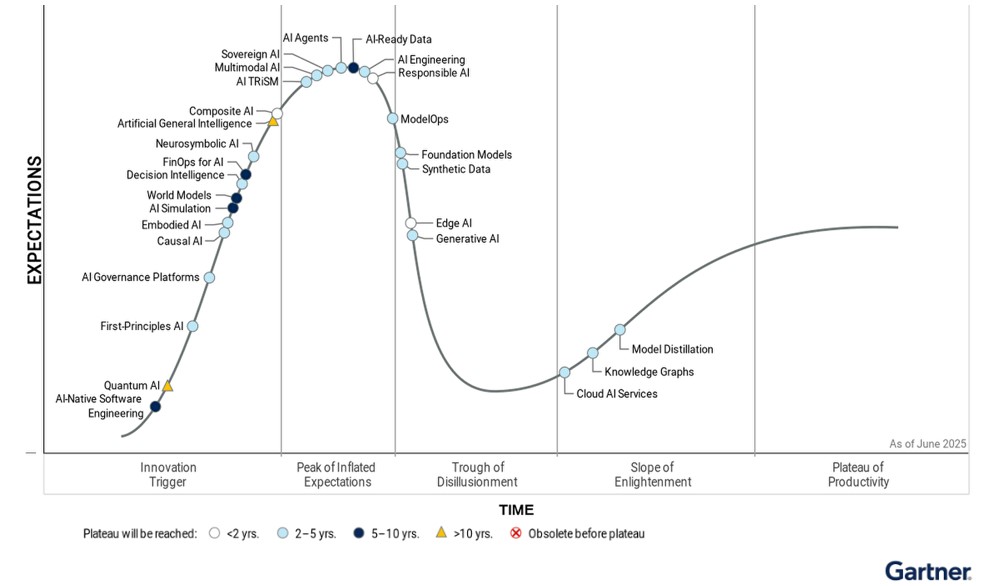AI agents have emerged as the fastest-advancing technologies on Gartner’s summer 2025 Hype Cycle for Artificial Intelligence analysis. These technologies are experiencing heightened interest this year by HR tech buyers, accompanied by ambitious projections that place them at what Gartner calls the “peak of inflated expectations.”
While the hype around fully autonomous AI agents continues to grow, the reality for enterprises is more nuanced. Organizations are successfully deploying AI agents for specific, well-defined tasks.
However, one expert says the most effective implementations require structure, governance and human oversight—just like hiring a human employee. For HR leaders navigating this transformation, understanding how to manage AI agents as part of the workforce presents both opportunities and challenges.
AI agents: from hype to reality
AI agents are becoming an operational reality across many enterprises, according to Emily Rakowski, chief marketing officer at Oro Labs, a procurement orchestration platform.
“We’re seeing organizations put them to work on clearly defined, repetitive tasks where the value is both measurable and immediate,” Rakowski says. She identifies examples as reviewing contracts, flagging supplier risks and generating reports.
The disconnect between perception and practice lies in expectations around autonomy. “The hype often comes from the idea that agents can operate fully independently, without structure,” she explains. “In reality, the most successful agentic AI deployments are grounded in clearly defined roles, embedded within orchestrated workflows and governed by human oversight.”

Treating AI agents like new employees
HR leaders should approach AI agent management with the same mindfulness used for human workforce planning: “with intention, structure and accountability,” according to Rakowski.
This includes providing agents with clear scopes of work, assigning a point of contact similar to a manager and creating systems to monitor performance and provide feedback. Rakowski says when agents are reviewing documentation or conducting policy checks, employees need to understand how to interpret outputs and escalate concerns.
She has found that some forward-thinking companies are merging technology functions, including AI agent management, with human resources into a single department, recognizing the overlap in workforce coordination responsibilities.
“This isn’t about HR becoming more technical,” Rakowski notes. “It’s about reinforcing the human side of digital transformation.” She says HR leaders can ensure the organization introduces AI agents in ways that build trust, encourage responsible use and empower employees to work alongside digital tools.
Read more: Is HR-IT integration right for your org? 4 experts weigh in
Without proper coordination, Rakowski says, organizations risk “agent sprawl.” This creates a situation where different teams deploy agents independently, leading to duplicated efforts, inconsistent standards and potential compliance issues.
HR can help establish enterprise-wide frameworks for naming conventions, ownership, documentation and performance evaluation by partnering with IT and operations teams. “This is similar to how HR supports other workforce categories, like contractors or temporary teams,” Rakowski explains. “It’s about ensuring every AI agent is visible, governed and aligned to a larger strategy, so adoption is coordinated rather than chaotic.”
AI agents as talent
The rise of AI agents is reshaping how organizations think about roles and talent. Rakowski explains that many companies are now designing jobs based on the assumption that AI will handle routine tasks. These include data analysis, contract reviews and compliance checks. This shift, she says, frees employees to focus on “more strategic, relational or judgment-based work.”

The growing prevalence of agents creates demand for employees who can collaborate with digital tools. Needed skills include interpreting AI-driven outputs and continuously improving human-machine collaboration. Rather than replacing roles, Rakowski puts the focus on redesigning them to reflect a hybrid, technology-enabled workforce.
“This is a mindset and culture shift that you have to promote and shape proactively,” Rakowski emphasizes. “And to be honest, it is critical for not just competitiveness, but staying relevant.”
Looking ahead: Embedded workflows and enhanced governance
Over the next 12-18 months, Rakowski expects that AI agents will become more embedded in daily workflows. Specifically, this will happen across departments, particularly in HR, finance and legal functions, where repeatable processes are common. However, increased capability means there is a need for stronger oversight.
“As agents become more capable, organizations will focus less on full autonomy and more on structured, trustworthy deployment that enhances human performance,” Rakowski predicted.
She advises companies to clearly define management responsibilities. Companies can achieve this by auditing outputs and setting explicit requirements for human involvement in agent-assisted processes.
For HR and operations leaders worried about control, transparency, or trust, Rakowski recommends starting with clear guardrails. She encourages defining each agent’s responsibilities, specifying how performance will be measured, and assigning accountability for oversight.
Additionally, she says that HR leaders should view agents as digital teammates rather than just tools. This means setting up clear processes for feedback, escalation and continuous improvement.
To avoid pitfalls, Gartner researchers advise that organizations scaling their AI initiatives must upgrade data-management practices. They say that a clean data foundation will develop trust and maintain compliance. It will also protect intellectual property and minimize issues like bias and hallucinations.
“Building trust doesn’t require technical expertise; it requires clarity, consistency and transparency,” says Rakowski. “When people understand what an agent does, why it’s there and how its work is validated, trust grows naturally.”
HR Executive features this article in its September 2025 editorial series, AI agents: Where are they now?



